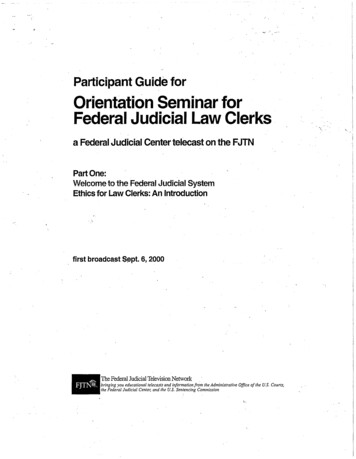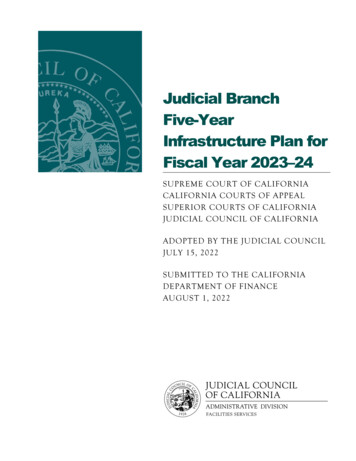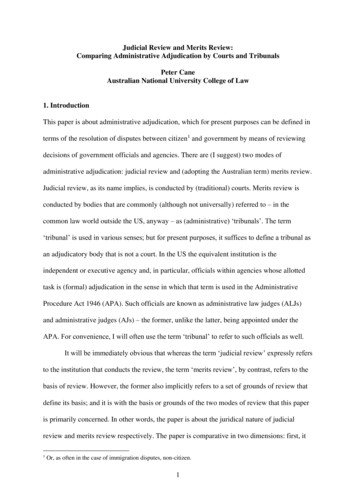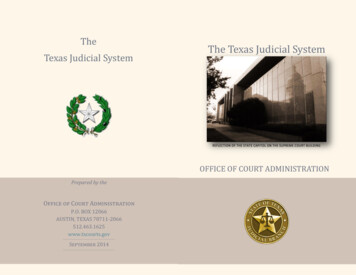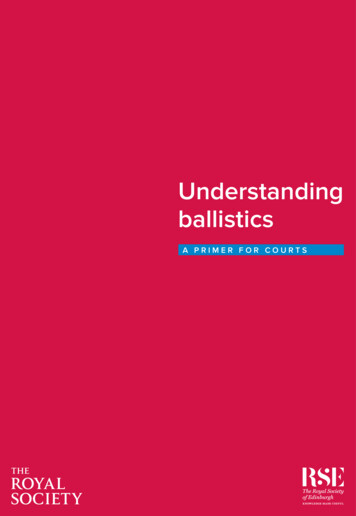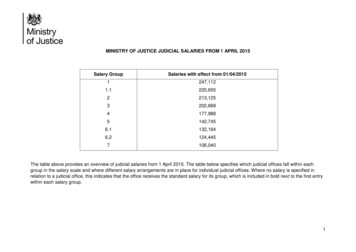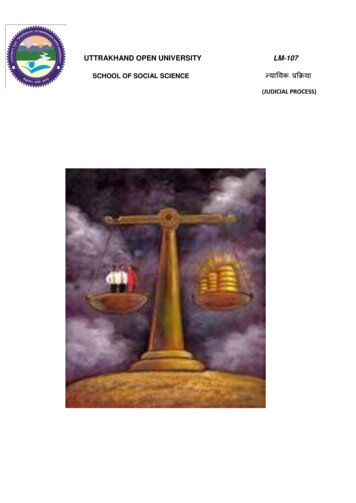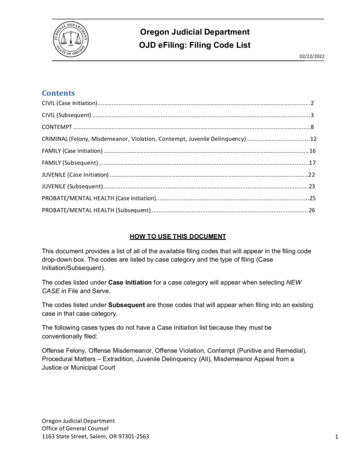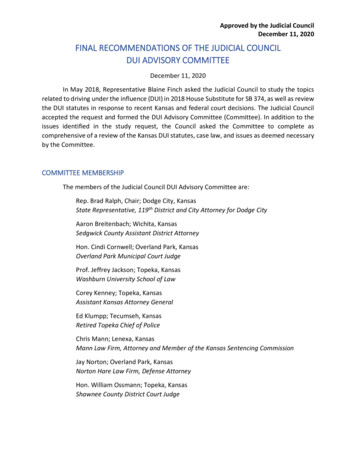
Transcription
Approved by the Judicial CouncilDecember 11, 2020FINAL RECOMMENDATIONS OF THE JUDICIAL COUNCILDUI ADVISORY COMMITTEEDecember 11, 2020In May 2018, Representative Blaine Finch asked the Judicial Council to study the topicsrelated to driving under the influence (DUI) in 2018 House Substitute for SB 374, as well as reviewthe DUI statutes in response to recent Kansas and federal court decisions. The Judicial Councilaccepted the request and formed the DUI Advisory Committee (Committee). In addition to theissues identified in the study request, the Council asked the Committee to complete ascomprehensive of a review of the Kansas DUI statutes, case law, and issues as deemed necessaryby the Committee.COMMITTEE MEMBERSHIPThe members of the Judicial Council DUI Advisory Committee are:Rep. Brad Ralph, Chair; Dodge City, KansasState Representative, 119th District and City Attorney for Dodge CityAaron Breitenbach; Wichita, KansasSedgwick County Assistant District AttorneyHon. Cindi Cornwell; Overland Park, KansasOverland Park Municipal Court JudgeProf. Jeffrey Jackson; Topeka, KansasWashburn University School of LawCorey Kenney; Topeka, KansasAssistant Kansas Attorney GeneralEd Klumpp; Tecumseh, KansasRetired Topeka Chief of PoliceChris Mann; Lenexa, KansasMann Law Firm, Attorney and Member of the Kansas Sentencing CommissionJay Norton; Overland Park, KansasNorton Hare Law Firm, Defense AttorneyHon. William Ossmann; Topeka, KansasShawnee County District Court Judge
Jeremiah Platt; Manhattan, KansasClark & Platt Law Firm, Defense AttorneyJohn Rapp; Wichita, KansasHinkle Law Firm, Defense AttorneyTed Smith; Topeka, KansasAttorney for the Kansas Department of RevenueRoger Struble; Salina, KansasBlackwell & Struble Law Firm, Defense AttorneyThe Committee is grateful for the assistance of Jason Thompson, Senior AssistantRevisor of Statutes.2
Table of ContentsRecommendations . 5Background . 10Administrative Penalties . 12Ignition Interlock . 12What is an ignition interlock device? . 12Current Law . 12Affordability Program . 13Compliance-Based Removal. 16Driver Under 21. 18Removal of Waiting Period & Route Restrictions . 18Driver’s License Reinstatement . 19Motorized Bicycle License . 21Commercial Driver’s License (CDL) Disqualification . 22Lookback Period for Determining Lifetime Disqualification . 22Removal of Lifetime Disqualification . 22Disqualification for Trafficking in Persons . 23Criminal Penalties . 24Diversion . 24Plea Bargaining. 25Sentencing. 26DUI in a Non-Commercial Vehicle . 26DUI in a Commercial Vehicle . 28Horizontal Gaze Nystagmus (HGN) Test . 29Classification of Prior Offenses . 30Criminalization of Test Refusals . 32Drugged Driving . 33DUID . 33Zero Tolerance . 34Per Se . 35Operating an Aircraft Under the Influence . 36TABLE OF CONTENTS3
Proposed Statutory Amendments . 52K.S.A 3-1001 . 52K.S.A. 3-1002 . 55K.S.A. 3-1003 . 58K.S.A. 3-1004 . 59K.S.A. 3-1005 . 61K.S.A. 2019 Supp. 8-235 . 62K.S.A 2019 Supp. 8-2,142 . 64K.S.A. 2019 Supp. 8-2,144 . 69K.S.A. 2019 Supp. 8-1015 . 76K.S.A. 2019 Supp. 8-1016 . 80K.S.A. 2019 Supp. 8-1567 . 83K.S.A. 2019 Supp. 8-1567a(f). 93Reinstatement of Driver’s License . 94K.S.A. 2019 Supp. 12-4415 . 95K.S.A. 2019 Supp. 22-2908 . 97TABLE OF CONTENTS4
RecommendationsAdministrative PenaltiesIgnition InterlockAffordability Program In order to enable more people to use and complete the ignition interlock device (IID)program, the Committee recommends that Kansas move from an indigency-basedprogram, one which only helps individuals who qualify for the food assistance program,to an affordability-based program, one which utilizes a sliding scale of payment based onthe IID user’s household income.The Committee recommends expanding who qualifies for the program to persons whosehousehold income is up to 300% of the federal poverty level. In order to centralizemanagement of the program, the Committee recommends the division, not the IIDproviders, determine eligibility for the program and the individual’s household income forthe purposes of the sliding scale.The current IID affordability program is based on a person’s eligibility for the foodassistance program. The Committee recommends expanding that category to includeindividuals who are enrolled in the food assistance program, the childcare subsidyprogram, cash assistance (TANF), or are eligible for the low-income energy assistanceprogram (LIHEAP).Compliance-Based Removal The Committee recommends Kansas adopt a compliance-based removal system. Itrecommends that before the IID can be removed and the person’s unrestricted drivingprivileges restored, the person must show (1) the IID has been installed for the requiredlength of time, and (2) the person has not had more than three standard violations andno serious violations in the 90 consecutive days prior to the person’s application forreinstatement of unrestricted driving privileges.Driver Under 21 The Committee agreed that the ignition interlock period for a driver under the age of 21with a lower BAC (0.02-0.0799) should not be greater than the ignition interlock periodrequired if the driver’s BAC had been higher (0.08-0.1499). Therefore, the Committeerecommends the ignition interlock period for a driver under the age of 21 with a BAC of0.02-0.0799 should be 180 days.RECOMENDATIONS5
Removal of Waiting Period & Route Restrictions In order to decrease the burden on Kansans and reduce the complexity of theadministrative driver’s licenses sanctions, the Committee recommends the removal of the45 or 90 day waiting period and the elimination of the route restrictions in K.S.A. 2019Supp. 8-1015(a).Driver’s License Reinstatement The Committee recommends a person whose license is restricted to operating only amotor vehicle with an ignition interlock device installed may apply to the division of motorvehicles for reinstatement of his or her driver’s licenses if (1) the person has served thelength of time of the original IID restriction period, plus an additional five years, excludingany period of incarceration; (2) during the IID restriction period and the additional fiveyears, the person has not had any alcohol or drug related convictions, occurrences, orpending proceedings; and (3) during the IID restriction period and the additional fiveyears, the person has not been convicted of, or has a pending charge or proceedingrelated to: transportation of liquor in opened containers, buying or consuming alcohol bya minor, vehicular homicide, DUI, driving while suspended, perjury, fraudulentregistration of a vehicle, any felony if a motor vehicle was used in the perpetration of thecrime, failing to stop at the scene of an accident, failure to maintain motor vehicle liabilityinsurance, two or more moving traffic violations, or revocation, suspension, cancellationor withdrawal of driving privileges due to another action.Motorized Bicycle License The Committee recommends deletion of K.S.A. 2019 Supp. 8-235(d)(3) and (e) toeliminate the seldom used motorized bicycle licenses for first-time DUI offenders in orderto allow the state to qualify for the additional federal funding.CDL DisqualificationLookback Period for Determining Lifetime Disqualification The Committee recommends the lookback period for determining whether a commercialdriver’ license (CDL) holder receives a lifetime disqualification be limited to offensesoccurring on or after July 1, 2003. The Committee also recommends amending K.S.A. 2019Supp. 8-2,142 to authorize the department of revenue to create a system to allowcurrently disqualified drivers to request a review and possible modification of a lifetimedisqualification when at least one of the disqualifying offenses occurred before July 1,2003.RECOMENDATIONS6
Removal of Lifetime Disqualification The Committee recommends that Kansas provide a way for former CDL drivers who aredisqualified for life to request the removal of that disqualification if the driver has beendisqualified for at least 10 years, and the department of revenue determines that thedriver meets very specific requirements.Disqualification for Trafficking in Persons In 2019, federal regulations were update to require that a commercial driver who uses acommercial motor vehicle in the commission of a felony involving an act or practice ofsevere forms of trafficking in persons must be disqualified for life and cannot be eligiblefor the removal of the disqualification after 10 years. The Committee recommends K.S.A.8-2,142(e) be updated to mirror the changes in the federal regulation.Criminal PenaltiesDiversion The Committee recommends K.S.A. 2019 Supp. 12-4415(b) be amended to include adirect reference to the definition of “an alcohol related offense” in K.S.A. 12-4413(e) inorder to point practitioners to the definition and remind city attorneys that K.S.A. 2019Supp. 12-4415(b) does not prohibit diversion agreements in a wider range of offenses thatcould be alcohol related in the generic use of the term.The Committee also recommends amendments that would allow a diversion agreementif a DUI incident involving a motor vehicle accident or collision results in personal injuryto only the driver committing the DUI.Finally, the Committee recommends sections be added to K.S.A. 2019 Supp. 12-4415 and22-2908 specifying that the prosecutor may not enter into a diversion agreement on acomplaint or traffic citation alleging a violation of acts prohibited under Chapter 8 of theKansas Statutes Annotated if the defendant was a commercial driver’s licenses holder atthe time the violation was committed or any subsequent time prior to being consideredfor diversion. The Committee recommends the State continue to comply with 49 C.F.R.384.226, and prohibit the masking of convictions associated with commercial motorvehicle license holders.RECOMENDATIONS7
Plea Bargaining The Committee recommends K.S.A. 2019 Supp. 8-2,144(l) and 8-1567(n) be clarified so aprosecutor does not mistakenly think the prosecutor is prohibited from amending ordismissing an unsupported DUI charge.SentencingDUI in a Non-Commercial Vehicle For first, second, and third time offenses, the Committee recommends allowing the courtto place the offender on probation immediately, rather than mandating the offenderserve a specific amount of time imprisoned before probation begins.The Committee also recommends allowing the court to waive any portion of a fineimposed, except the 250 required to be remitted to the state treasurer, if the offendershows successful completion of court-ordered education or treatment.For first time offenders, the Committee recommends removing the requirement to servethe 48 consecutive hours imprisonment prior to being placed on probation. TheCommittee recommends the court be allowed to place the offender on probation underterms dictated by the court.For a second time offender, serving the minimum 120 hours of confinement all at once isnot required by federal funding regulations; therefore, the Committee recommends theoffender be given the flexibility to serve the ordered confinement as best serves the court,jail, and offender. The Committee agreed that an offender on probation should berequired to serve at least 48 hours imprisoned, but recommends the offender be eligibleto participate in a work release or house arrest program regardless of whether theoffender has yet served any time imprisoned.For a third time offender, the Committee recommends maintaining the distinctionbetween a third-time misdemeanor and a third-time felony.For a third-time misdemeanor, if the offender is eligible and is placed on probation, theCommittee recommends the statute require probation to include at least 30 daysconfinement, rather than 90 days confinement. The Committee recommends maintainingthe requirement that the offender serve 48 consecutive hours imprisonment beforebecoming eligible to serve the remaining term of confinement through a work release orhouse arrest program.To ease the burden of counting thousands of hours, the Committee recommends thestatute require that an offender receive hour-for-hour credit for time confined up to thefederally required minimum (120 hours for a second time offender and 240 hours for athird time offender), but for any time served beyond the federal minimum, the offenderwould receive day-for-day credit.RECOMENDATIONS8
For third offense felony offenders, as well as fourth and subsequent offenders, theCommittee recommends the offense be designated as severity level 6 nonperson feloniesand the offender be sentenced according to the criminal sentencing guidelines.The Committee strongly supports the creation and implementation of DUI treatmentcourts in Kansas. The Committee urges the creation of a Kansas Supreme Court Taskforceto evaluate and make recommendations about future implementation of DUI treatmentcourt programs in Kansas.DUI in a Commercial Vehicle The Committee recommends the proposed changes to DUI in a non-commercial vehiclealso apply to DUIs in commercial vehicles under K.S.A. 2019 Supp. 8-2,144.Drugged Driving The Committee acknowledges drugged driving is an area of growing concern andrecommends immediate and in-depth consideration by the legislature. The Committeediscussed differing approaches governing drugged driving, including the approach set outin 2018 H. Sub for SB 374, but was unable to form a consensus on what approach wouldbe best for Kansas.Operating an Aircraft Under the Influence Because Kansas’ statutes governing the crime of operating an aircraft under the influencehave never been updated, the Committee recommends the statutes be updated.Legislation The Committee requests the Judicial Council introduce the Committee’s proposedstatutory amendments in the 2021 legislative session.RECOMENDATIONS9
BackgroundThe Committee began meeting in December 2018 and continued to meet through 2020.The Committee was chaired by a legislator and included prosecutors, defense attorneys, amunicipal court judge, a district court judge, an attorney from the Kansas Department of RevenueMotor Vehicles Division, the Kansas Attorney General’s Traffic Safety Resource Prosecutor, aconstitutional law professor, a representative from the Kansas Sentencing Commission, and a lawenforcement representative.The Committee began its work by identifying as many DUI-related issues as possible anddiscussed whether to work on redefining Kansas DUI and rewriting Kansas’ DUI code. Ultimately,the Committee agreed to do neither. Instead, it agreed to work within the existing statutoryframework to recommend improvements as needed.At its first meeting, the Committee unanimously agreed to recommend time sensitivestatutory amendments regarding the oral and written notice provided by law enforcement whenrequesting a driver submit to an evidentiary test of the driver’s blood, breath, urine, or otherbodily substance to determine the presence of alcohol or drugs, and the removal ofunconstitutional statutory language remaining in the statutes. In January 2019, the JudicialCouncil approved the Committee’s recommendations which became 2019 HB 2104. The billpassed and went into effect April 18, 2019.Many of the Committee’s 2019 meetings focused on the subject of ignition interlock. Atthe end of 2019, the Committee finalized its recommendations regarding affordability andcompliance-based removal of ignition interlock devices and the availability of a driver’s licensefor a motorized bicycle. In December 2019, the Judicial Council approved the Committee’srecommendations which became 2020 SB 405. Due to the COVID-19 pandemic, the 2020legislative session ended early and the bill did not pass.Throughout 2019 and 2020, the Committee considered a wide variety of topics, including:the criminalization of test refusal, the administrative process, criminal sentencing provisions,drug impaired driving, plea bargaining, treatment courts, out-of-state residence who receive aKansas DUI, classification of prior offenses, diversions, DUI offenders who do not own a vehicle,flying under the influence, ignition interlock, and preliminary screening tests. The Committee’sfinal recommendations and discussion of topics is included in this report.DUI law has two different penalty types – criminal and administrative. The criminalpenalties involve the prosecution of the crime of driving under the influence. The sentence forthe crime of DUI is ordered by the court and is independent from any administrative penaltyBACKGROUND10
imposed by the Kansas Department of Revenue Division of Motor Vehicles (the division) againsta person’s driver’s license. A driver may be stopped by a law enforcement officer, fail apreliminary breath test, be arrested for DUI, and fail the evidentiary breath test. The localprosecutor will evaluate whether to charge the driver with the crime of DUI and the case will behanded through the court. At the same time, based on the driver’s failure of the evidentiarybreath test, the KDOR will take administrative action against the person’s driver’s license. Theadministrative actions are not dependent on the criminal proceeding or whether the person isever convicted of DUI.The Committee reviewed and addressed topics in both the criminal and administrativepenalty systems. To assist in understanding the different penalties associated with the criminaland the administrative systems, a chart of the penalties begins on page 37.BACKGROUND11
Administrative PenaltiesIgnition InterlockWhat is an ignition interlock device?An ignition interlock device (IID) is a tool that separates drinking from driving and allowsimpaired driving offenders to maintain conditional driving privileges. The purpose of the IID is toprevent drivers, who have consumed alcohol, from operating a motor vehicle if their breathalcohol content exceeds a set point (typically 0.02). Drivers must provide a breath sample byblowing into the IID and if the driver’s breath alcohol level is over the set point, the vehicle willnot start. If the driver’s breath alcohol level is below the set point, the vehicle will start; however,while the vehicle is in operation, the IID will prompt the driver to provide additional breathsamples (rolling retest).Current LawIf a law enforcement officer requests a driver take a breath, blood, urine or other bodilysubstance test to determine the presence of drugs or alcohol, and the driver refuses to submitto the test, the division will take administrative action against the person’s driving privileges. Thisadministrative process is completely separate from the criminal DUI case or sentence. Throughthe administrative process, the division will suspend the person’s driving privileges for one year.At the end of the suspension, the division then restricts the person’s driving privileges for two toten years depending on the driver’s history of test refusal. During the restricted period, the drivermay only drive a motor vehicle equipped with an IID.A similar process applies when a driver fails a breath, blood, or bodily fluid test, or isconvicted of an alcohol or drug-related conviction.1 The driver is suspended for a period of timeand then restricted to using an IID for another period. A chart showing the timeframes for the1“Alcohol or drug-related conviction” is defined in K.S.A. 8-1013(b) as including any of the following: “(A)Conviction of vehicular battery or aggravated vehicular homicide, prior to their repeal, if the crime is committedwhile committing a violation of K.S.A. 8-1567, and amendments thereto, or the ordinance of a city or resolution ofa county in this state which prohibits any acts prohibited by that statute, or conviction of a violation of K.S.A. 82,144 or 8-1567, and amendments thereto, conviction of a violation of aggravated battery as described in K.S.A.21-5413(b)(3) or (b)(4), and amendments thereto, or conviction of a violation of involuntary manslaughter asdescribed in K.S.A. 21-5405(a)(3) or (a)(5), and amendments thereto; (B) conviction of a violation of a law ofanother state which would constitute a crime described in subsection (b)(1)(A) if committed in this state; (C)conviction of a violation of an ordinance of a city in this state or a resolution of a county in this state which wouldconstitute a crime described in subsection (b)(1)(A), whether or not such conviction is in a court of record; or (D)conviction of an act which was committed on a military reservation and which would constitute a violation ofK.S.A. 8-2,144 or 8-1567, and amendments thereto, or would constitute a crime described in subsection (b)(1)(A) ifcommitted off a military reservation in this state.”IGNITION INTERLOCK12
suspension and restricted ignition interlock periods begins on page 37. The required IID restrictedperiod can range from 6 months to 10 years depending on the type of offense.2Affordability ProgramAccording to the division, about half of all Kansas drivers required to complete a periodwith an IID restricted license will successfully complete the IID program requirements and havetheir driver’s license privileges reinstated. The other half of drivers will remain either suspendedor restricted indefinitely. The Committee’s goal was to identify and reduce barriers toparticipation in the IID program and increase the number IID users in Kansas.The Committee reviewed the compliance data for drivers whose licenses were suspendedor restricted due to an alcohol or drug related offense in 2014. Forty-eight percent of the driversfailed to install the IID as required. Of the drivers who failed to install the IID, 75% received asubsequent driving offense, indicating that they were continuing to drive without the requiredIID. The division estimated that about half of the drivers who fail to complete the IID program doso because of the financial cost of the IID. Depending on the IID provider, the annual cost of anIID ranges from 950 to 1,215. The annual cost does not include any fees incurred due to noncompliance, including a lockout, tampering, or circumvention of the device.K.S.A. 2019 Supp. 8-1016(a)(5) requires the division adopt rules and regulations requiringall IID providers operating in Kansas to provide a credit of at least 2% of the gross programrevenues in the state as a credit for those who are required to have an IID and who qualify forthe federal food assistance program. In 2019, there were eight IID providers operating IIDprograms and 10,504 IID devices in operation in Kansas. The eight IID providers reported thatonly 224 people or around 2% of users participated in the provider’s affordability programs. EachIID provider sets its own fees and manages its program differently. Some waived one-time fees(such as installation or removal fees) while others merely reduced the one-time fees. Allproviders reduced the monthly leasing and monitoring fee. None waived it completely.Therefore, even for those who qualified for the program, the set annual cost of the IID rangedfrom 494 to 915.3The Committee agreed the IID affordability program is essential to allowing all driversrequired to use an IID to participate and complete the IID program. The Committee’s overall goalwas to have as many people as possible use and successfully complete the IID program. Thedivision estimates that about half of the drivers who fail to complete the required IID programdo so because of the financial cost of the IID.23K.S.A. 8-1014.All information regarding the 2018 IID usage and indigency programs provided by the Kansas Highway Patrol.IGNITION INTERLOCK13
In order to enable more people to use and complete the IID program, the Committeerecommends that Kansas move from an indigency-based program, one which only helpsindividuals who qualify for the food assistance program, to an affordability-based program, onewhich utilizes a sliding scale of payment based on the IID user’s household income. TheCommittee reviewed other states’ IID affordability program structures and received input fromthe Coalition of Ignition Interlock Manufacturers (CIIM). CIIM explained that in states withaffordability programs where all IID related costs are waived, people are more likely to damagethe IID, not take the program seriously, and fail to follow program requirements. Therefore, theCommittee agreed that the affordability program should offer a sliding scale of discounts basedon a user’s household income rather than waive fees entirely.The Committee recommends expanding who qualifies for the program to persons whosehousehold income is up to 300% of the fe
DUI ADVISORY COMMITTEE December 11, 2020 In May 2018, Representative Blaine Finch asked the Judicial Council to study the topics related to driving under the influence (DUI) in 2018 House Substitute for SB 374, as well as review the DUI statutes in response to recent Kansas and federal court decisions. The Judicial Council



